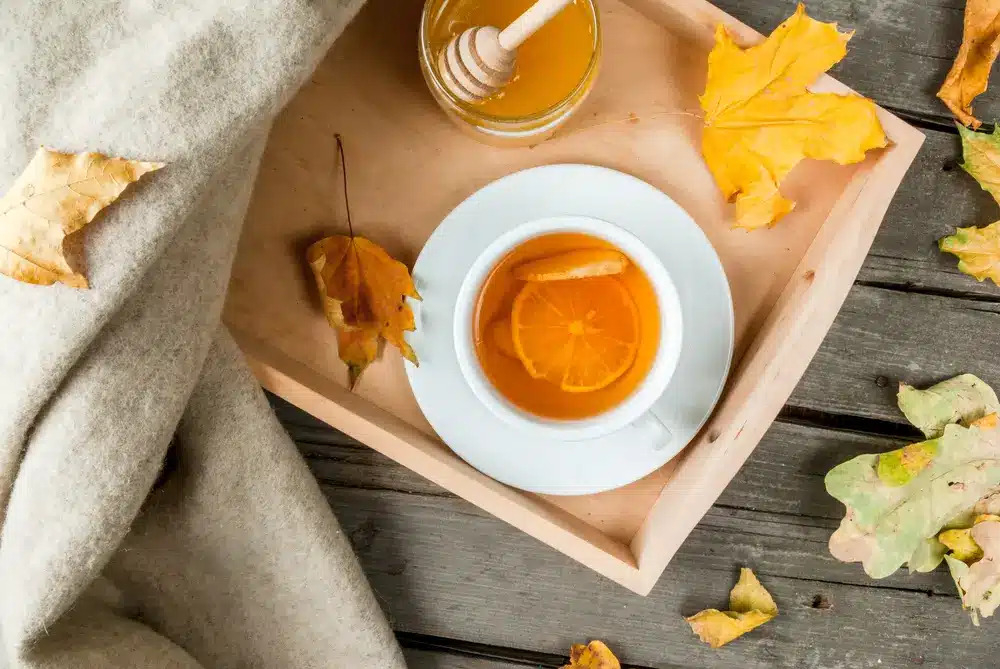
Concierge Primary Care At Your Doorstep
Experience primary care without leaving your home. Join our waitlist today and enjoy healthcare tailored to your needs–comfortably and conveniently.
Table of Contents
10 Ways To Stay Healthy During Autumn
As the vibrant colors of summer fade into the warm and cozy hues of autumn, our routines and lifestyles undergo a transformation. With cooler temperatures, falling leaves, and the return of pumpkin-spiced everything, it’s a season that brings unique opportunities and challenges.
This article explores practical fall health tips and insights to maximize this enchanting season while prioritizing your physical and mental health. From adopting a fitness routine to embracing seasonal nutrition, allow Medical House Calls to guide you through the autumn months with strategies for a healthier and more vibrant you.
1. Schedule a Check-Up
Routine exams, also known as preventive or annual check-ups, are valuable for several reasons:
Early Detection of Health Issues
Wellness exams often involve reviewing your medical history and physical examination and discussing symptoms or concerns. Through these exams, healthcare providers can identify problems early when they are more manageable and often less expensive to treat. Early detection can lead to better outcomes and may even save lives.
Risk Assessment
During an exam, the medical practitioner evaluates risk factors for various ailments, including heart disease, diabetes, cancer, and others. This develops a personalized plan to mitigate or manage those risks through lifestyle changes or medical interventions.
Preventive Screenings
Routine exams often include recommended screenings and tests based on age, gender, and risk factors. These screenings can detect conditions like high blood pressure, high cholesterol, diabetes, and certain tumors before symptoms develop.
Vaccination Updates
Your healthcare provider can ensure you are up-to-date with vaccinations and recommend necessary booster shots.
Medication Review
If you take prescription medications, a checkup is an opportunity to review the medications, dosages, and potential side effects. Adjustments or changes may be made if necessary.
Health Education
Wellness exams allow you to receive guidance on diet, exercise, stress management, and other factors impacting your well-being. Providers can offer advice and resources for maintaining a healthy lifestyle.
Mental Health Check
Your emotional and mental well-being is an essential part of your health. Checkups may include discussing stress, anxiety, depression, or other concerns. Providers can offer guidance, referrals, or treatments as needed. Check out this
Continuity of Care
Regular exams establish a consistent relationship with a healthcare provider. This continuity enables the provider to understand better your preferences and needs, which can lead to more effective healthcare.
Peace of Mind
Being proactive about your health can reduce anxiety and empower you to take control of your well-being.
Documentation
Wellness exams create a comprehensive medical record. It can track progress and provide a valuable history in emergencies or when seeking specialized care.
2. Get a Flu Shot
Flu season occurs in the fall and winter months when influenza (the flu) viruses are more active and can spread more easily. Annual vaccination is recommended for most individuals six months and older, with few exceptions. Consult with your healthcare provider to determine the best timing and type.
Annual vaccination against the flu offers several benefits:
- 1. Protection Against Influenza: The most obvious benefit of getting an annual flu vaccine is protecting against the flu. Influenza is a contagious respiratory illness. The vaccine provides immunity against the strains of influenza virus expected to circulate.
- 2. Reduced Severity of Illness: Even if you contract the flu, the vaccine can reduce the severity and duration of the illness. It may also lower the risk of developing complications resulting from a severe flu infection.
- 3. Protection of Vulnerable Populations: Getting vaccinated helps protect those at higher risk of severe illness or complications, such as older adults, young children, pregnant women, and individuals with chronic health conditions. These groups are likelier to experience severe flu-related consequences.
- 4. Community Immunity (Herd Immunity): Widespread flu vaccination can improve community immunity. When a significant portion of the population is immune to the flu, the virus has difficulty spreading, reducing the overall impact.
- 5. Preventing Healthcare Overload: During flu season, healthcare facilities can become overwhelmed with flu cases, leading to increased hospitalizations and strain on healthcare resources.
- 6. Protection of Healthcare Workers: Healthcare workers are at increased risk of exposure. Vaccinating healthcare personnel reduces the risk of transmitting the flu to vulnerable patients.
- 7. Economic Benefits: Widespread vaccination can benefit economically by reducing costs associated with flu-related hospitalizations and medical visits. It can also minimize the economic impact of absenteeism from work or school.
- 8. Convenience and Accessibility: Flu vaccines are available in various settings, including doctors’ offices, pharmacies, and clinics. Many workplaces and schools also offer vaccination programs.
- 9. Annual Adaptation to Strain Changes: The vaccine is updated annually to match the most prevalent and concerning strains. This ensures it’s effective against the strains likely circulating during the approaching flu season.
While the flu vaccine can prevent influenza and its complications, it may not provide 100% protection. Medical House Calls provides rapid strep and flu testing, along with treatment for a cold and flu, in the comfort and safety of your own home.
3. Take a Vitamin D Supplement
Boosting your temperament and supporting your immune system in the autumn can be vital for your well-being when there is reduced sunlight and the risk of seasonal illnesses. Vitamin D plays a role in mood regulation and immune function and can be relevant during this time of year. When considering vitamin D supplementation, below are some fall health tips and considerations:
- Consult a Healthcare Provider: Before starting a supplement regimen, it’s advisable to consult with a healthcare provider or dietitian. They can recommend an appropriate dosage and monitor your progress.
- Dosage: The recommended vitamin D dosage depends on your circumstances, such as your current vitamin D levels, age, and health. Your doctor can determine the appropriate dosage.
- Vitamin D Testing: Some providers may recommend a blood test to measure your vitamin D levels. This can determine if you have a deficiency and guide the appropriate dosage.
- Type of Vitamin D: There are two vitamin D supplements: vitamin D2 (ergocalciferol) and vitamin D3 (cholecalciferol). Vitamin D3 is more effective at raising blood levels of vitamin D. However, your healthcare provider will advise the most suitable form.
- Sunlight Exposure: If you can expose your skin to natural sunlight, it can complement vitamin D supplementation. Sunlight is a natural source of vitamin D production in the body.

4. Eat Healthy and Seasonal
Eating in-season is a great way to enjoy fresh, nutritious meals. Below are some fall health tips on healthy food options to contemplate when planning your autumn meals:
- Root Vegetables: Carrots, sweet potatoes, beets, and turnips are abundant in the fall. They are rich in fiber, vitamins, and minerals.
- Winter Squash: Varieties like butternut, acorn, and spaghetti squash are in season in autumn. They are high in fiber and provide vitamins and antioxidants.
- Apples and Pears: Autumn is apple and pear season, and these fruits make for healthy snacks and additions to sweet and savory dishes. They are rich in fiber, vitamins, and antioxidants.
- Cruciferous Vegetables: Broccoli, cauliflower, and Brussels sprouts peak in the fall. They are excellent sources of vitamins, fiber, and antioxidants.
- Dark Leafy Greens: Kale, Swiss chard, and spinach thrive in cooler weather. They are nutrient-dense and provide vitamins and minerals like Magnesium.
- Pumpkin: A good source of vitamin A, fiber, and potassium. You can make soups, pies, muffins, and savory dishes like pumpkin risotto.
- Cranberries: A signature fall fruit packed with antioxidants.
- Nuts: Autumn is when almonds, walnuts, pecans, etc., are harvested. Nuts are rich in healthy fats, protein, vitamins, and minerals.
- Mushrooms: Wild mushrooms and various cultivated varieties add a unique flavor and texture to dishes while providing nutrients like vitamin D and B vitamins.
- Herbs: Sage, rosemary, and thyme are popular in autumn recipes.
- Whole Grains: Incorporate whole grains like quinoa, farro, and barley. They are high in fiber and provide essential nutrients.
- Lean Proteins: Pair your dishes with lean protein sources such as chicken, turkey, fish, and tofu to create balanced and satisfying meals.
When cooking autumn meals, incorporate seasonal foods to maximize flavor and nutrition. Also, consider preserving or freezing some to enjoy throughout winter.
5. Spend Time Outdoors
Staying active with walks, runs, and yard work in autumn is a fantastic way to enjoy the fall weather while maintaining a healthy lifestyle. Here are some fall health tips during this season:
- Embrace the Colors: One of the joys of autumn is the vibrant foliage. Use this as motivation to get outside. Take strolls or jogs through parks, forests, or nature trails to enjoy the changing leaves and crisp air. It can be refreshing and inspiring.
- Set Goals: Whether you’re a runner, walker, or looking to be more active, set specific goals. This could include a certain distance, duration, or number of steps per day or week. Having goals keeps you motivated.
- Safety First: With shorter daylight hours, it’s crucial to prioritize safety. If you’re running or walking in low-light conditions, wear reflective clothing and carry a flashlight or headlamp. Stick to well-lit paths, and let someone know your route and estimated return.
- Mix It Up: Autumn offers outdoor activities like cycling, hiking, or playing outdoor sports. These can add variety to your routine.
- Involve Family and Friends: Invite folks to join you. It’s a great way to spend quality time and make fitness a social experience.
- Yard Work: Autumn is a fantastic time to tackle gardening tasks. Raking leaves, planting bulbs, and preparing your garden for winter can provide a good workout.
- Stay Hydrated: Even in cooler weather, stay hydrated. Bring a water bottle when you’re active outdoors. Also, consider IV Hydration Therapy, which allows you to rapidly replenish your body with fluids faster and more efficiently than drinking alone.
- Mindful Walking/Running: Use outdoor activities as an opportunity for mindfulness. Pay attention to the sights, sounds, and sensations. Practice deep breathing and take in the beauty of the season.
- Stretch and Warm Up: Take a few minutes to warm up your muscles. This can prevent injuries and improve flexibility.
- Post-Activity Recovery: Take time to cool down. Consider incorporating yoga or foam rolling activities to enhance flexibility and reduce muscle soreness.
- Consume Seasonal Treats in Moderation: Autumn brings seasonal treats. While indulging occasionally is okay, enjoy these goodies in moderation to maintain a balanced diet.
Staying active in the autumn is beneficial for your physical health and well-being. The fresh air, scenery, and physical activity can reduce stress and boost the mood. Embrace the season and make the most of outdoor activities.
6. Keep Your Skin Moisturized
Here are some fall health tips for dry skin as it gets colder:
- Keep your skin hydrated. Drink plenty of fluids and apply moisturizer often.
- Take shorter, cooler showers. Hot water can strip away your skin’s natural oils, so keep showers short and cool.
- Use a humidifier. A humidifier can add moisture to the air, keeping your skin hydrated.
- Avoid harsh soaps and detergents. These can remove your skin’s natural oils, so use gentle products.
- Exfoliate often. Exfoliating removes dead skin cells, which helps moisturizers penetrate deeper.
- Wear sunscreen. Sun exposure can damage skin and make it more prone to dryness.
- See a doctor if your skin is severely dry or doesn’t improve with home treatments.
7. Layer Up When Temperatures Drop
As the weather cools in autumn, dress in layers. Wear moisture-wicking base layers to keep sweat away from your skin, add insulating layers for warmth, and top it with a windproof and waterproof outer layer if necessary. Remember to wear a hat and gloves to protect against the chill.

8. Be Vigilant About Hand Washing
By prioritizing proper handwashing, you can protect yourself and those around you from illness, maintain good health throughout autumn, and contribute to community well-being. To reduce the risk of illness in autumn:
- Use soap and warm water.
- Scrub your hands for at least 20 seconds, including between the fingers and under nails.
- Rinse with clean, running water.
- Dry your hands with a clean towel or air dryer.
- Use hand sanitizer with at least 60% alcohol if soap and water are unavailable.
Remember to wash your hands:
- Before preparing or eating food.
- After using the restroom.
- After coughing, sneezing, or blowing your nose.
- After being in public spaces or touching surfaces.
- After handling animals or their waste.
- After outdoor activities.
9. Take Time for Self Care
Autumn can be a wonderful season, but it also has changes in weather, daylight hours, and routines. Below are some fall health tips to navigate your mental well-being this season:
- Get Plenty of Natural Light: As the days get shorter, maximize exposure to natural light. Spend time outdoors during daylight hours, take walks, or sit near windows. This can regulate your circadian rhythms and boost your mood.
- Stay Socially Connected: Autumn can sometimes lead to decreased social interaction. Stay connected with loved ones.
- Set Goals: Fall is an excellent time to set or revisit goals. Whether related to fitness, hobbies, personal growth, or career aspirations, objectives provide a sense of purpose and motivation.
- Engage in Seasonal Activities: Embrace the beauty of autumn by participating in apple picking, pumpkin carving, or admiring the foliage. These activities can boost your spirits and create positive memories.
- Prioritize Sleep: The changing seasons can disrupt your sleep patterns. Maintain a consistent schedule, create a relaxing bedtime routine, and ensure your sleep environment is comfortable and restful.
- Limit Exposure to Negative News: Constant exposure to pessimistic news can increase stress levels. While staying informed is essential, consider limiting your exposure to distressing news, especially before bedtime.
- Self-Care: Prioritize self-care activities that help you relax and recharge. This can include reading, taking long baths, listening to music, or having tea. Self-care practices can improve your emotional well-being.
- Seek Professional Help: If your mental health is impacted, seek support from a professional. Therapy or counseling can provide valuable tools and strategies to manage seasonal affective disorder (SAD) or other mental health challenges.
- Gratitude Practice: Cultivate an attitude of appreciation by reflecting on what you are thankful for. This can shift your focus toward positive aspects.
10. Call or Text Medical House Calls!
Medical House Calls has emerged as an effective solution for bringing quality healthcare to your doorstep. Our mobile medical services save you time, reduce stress, and ensure no one is overlooked. Whether you have a non-critical condition, care for an elderly family member, or need pediatric assistance, we offer a practical alternative to traditional settings.
Embrace the convenience and personalized attention of Medical House Calls today!
Family & Individual Care Available
Enjoy personalized primary care customized for families and individuals, delivered conveniently at home. Discover flexible plans designed to keep everyone healthy and thriving.

















